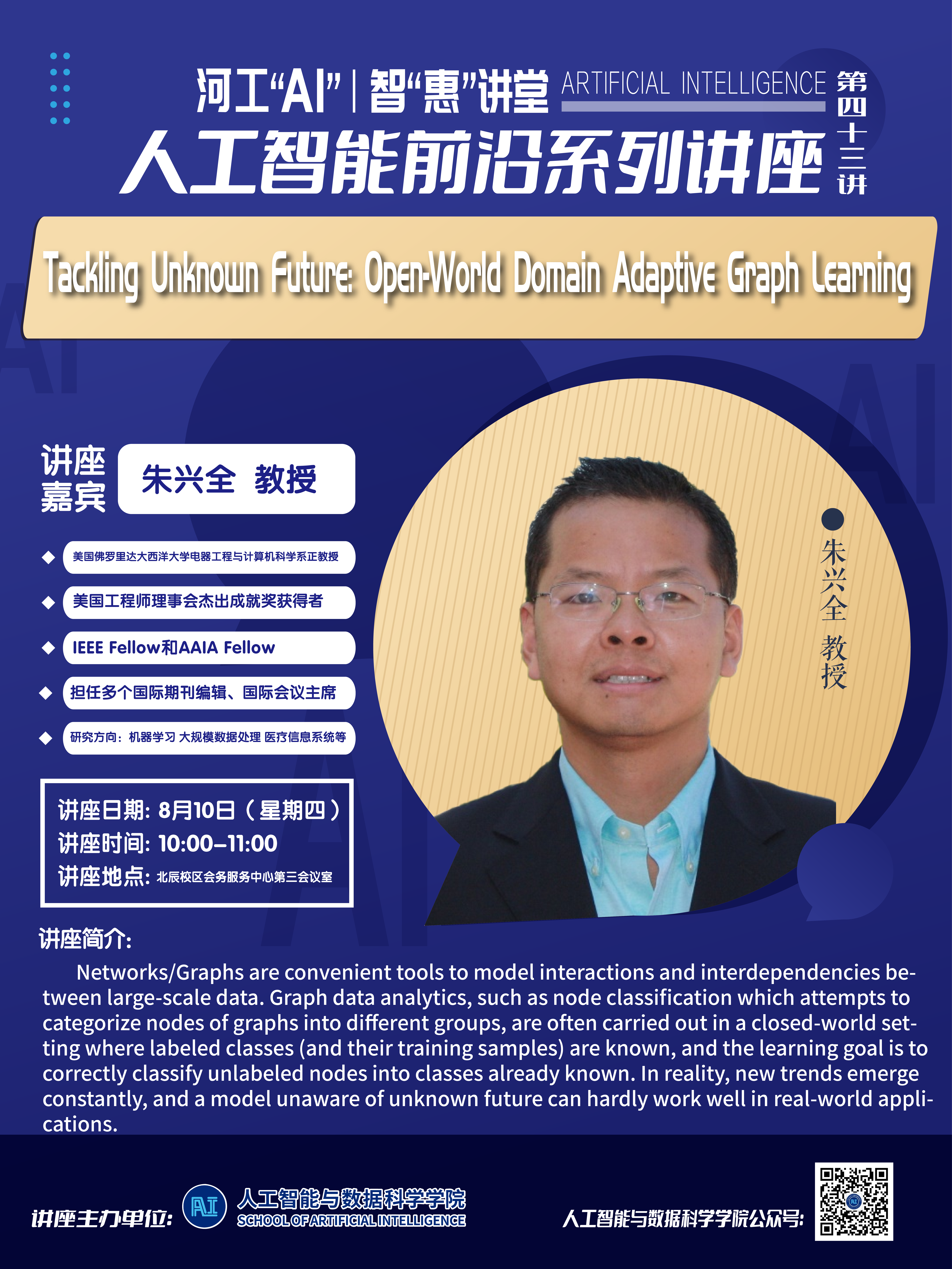
讲座时间:2023年8月10日(星期四)10:00-11:00
讲座地点:北辰校区会务服务中心第三会议室
讲座题目:Tackling Unknown Future: Open-World Domain Adaptive Graph Learning
讲座嘉宾:朱兴全 教授

讲座嘉宾:
Xingquan Zhu 现任美国佛罗里达大西洋大学电器工程与计算机科学系正教授。他在西安电子科技大学获得学士(通信工程)和硕士(通信与电子系统)学位,并在复旦大学获得博士学位(计算机软件与理论)。他先后在美国普渡大学,佛蒙特州立大学,澳大利亚悉尼科技大学,和佛罗里达大西洋大学从事科研和任教。他的研究领域包括机器学习,大规模数据处理,医疗信息系统等。他的研究并先后七次获得国际会议优秀论文奖,美国工程师理事会杰出成就奖,佛罗里达大西洋大学工程与计算机学院研究成就奖等。从2000年至今,他发表了300多篇科研论文,并被引用两万多次。他是国际电气电子工程师学会(IEEE)会士,和亚太人工智能协会(AAIA)会士。
他先后担任多个国际期刊副编辑,包括IEEE知识与数据期刊(TKDE), ACM知识挖掘期刊(TKDD),社会网络分析与挖掘国际期刊(SNAM),国际大数据期刊(Journal of Big Data),以及国际健康与生物工程网络分析期刊等(NHIB)。他先后担任多个国际会议主席及程序委员会主席等,包括第二十二届IEEE国际数据挖掘年会程序委员会主席(ICDM-2022), 2021 IEEE 大数据挖掘年会大会主席 (BigData-2021),第三十三届科学与统计数据库管理年会程序委员会主席 (SSDBM-2021)。 十四届IEEE生物信息与生物工程年会程序委员会主席(BIBE-2014),2013 IEEE粒度计算年会程序委员会主席(GRC-2013),第二十三届IEEE国际工具与人工智能年会程序委员会主席(ICTAI-2011),以及第九届和第十一届国际机器学习与应用年会程序委员会主席(ICMLA-2010)和大会主席(ICMLA-2012)等。
讲座简介:
Networks/Graphs are convenient tools to model interactions and interdependencies between large-scale data. Graph data analytics, such as node classification which attempts to categorize nodes of graphs into different groups, are often carried out in a closed-world setting where labeled classes (and their training samples) are known, and the learning goal is to correctly classify unlabeled nodes into classes already known. In reality, new trends emerge constantly, and a model unaware of unknown future can hardly work well in real-world applications.
In this talk, we address two fundamental problems in graph learning, open-world graph learning and unsupervised domain adaptive graph learning, in a setting that the learning is to predict test samples whose class label space is only partially known or completely unknown. For open-world graph learning, we propose a new open-world graph learning paradigm, where the learning goal is to not only classify nodes belonging to seen classes into correct groups, but also classify nodes not belonging to existing classes to an unseen class. To tackle unknown label space in a cross-domain learning setting, we propose an unsupervised domain adaptive graph convolutional network, where all nodes in a target domain are unlabeled. Domain adaptation aims to transfer knowledge from the graph of an existing domain with labeled nodes to classify nodes in the target domain.